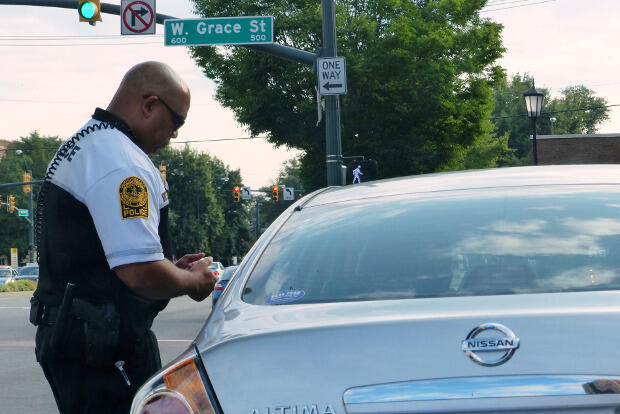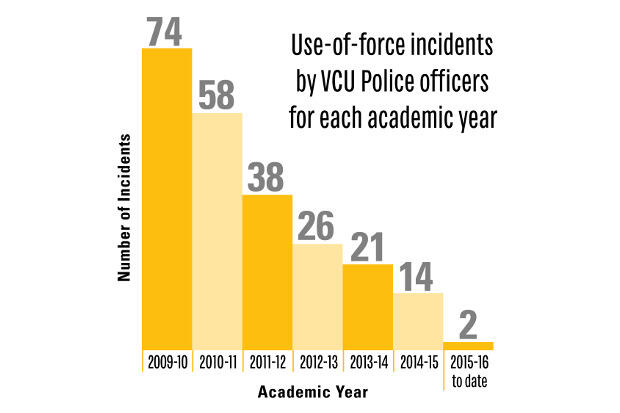
Nov. 4, 2015
Tackling bias: VCU Police trains to ensure fair and impartial practices
Share this story
Everyone has biases.
No matter who you are, where you’re from, or what you believe in, you either have explicit or implicit biases.
Just ask Anna Laszlo.
Laszlo is the chief operating officer of Fair & Impartial Policing LLC. She recently spent three days with her staff teaching fair and impartial policing to the 92 sworn officers of the Virginia Commonwealth University Police Department.
It is critical in our environment to treat members of this community fairly and equally with each and every encounter that we have.
The courses taught VCUPD officers how to recognize human biases, how those biases affect perceptions and behavior and how biased policing impacts a department and the community.
“It is critical in our environment to treat members of this community fairly and equally with each and every encounter that we have,” VCU Police Chief John Venuti said of the training.
Law enforcement agencies offer this type of training either after an alleged bias-based incident occurs or without an incident to prompt it. For VCUPD, it’s the latter.
“This is much more than diversity training, which our officers have already had,” Venuti said. “We are constantly looking for better ways to approach and work with community members.”
Since 2010, when Venuti became chief, VCUPD has had dramatic decreases in the number of complaints against officers, use of force by officers and a decrease in bias-based complaints. He’s proud both of those strides and the continued focus on training.
“It’s a proactive and frankly necessary training on our part to mandate it for officers,” Venuti said.

Breaking stereotypes
Laszlo says bias is a “normal human attribute — even well-intentioned people have biases.” She calmly and directly sums up “contact theory” to explain how a stereotype can be broken.
“If we don’t know an individual as an individual, we stereotype people based on group characteristics,” she said. “If you spend time with people outside of your ‘in’ group, stereotypes wear down because you see people as individuals, and not the stereotype.”
FIP is training based on scientific research about human behavior. There are two types of biases a person can have: explicit or implicit. Laszlo said people with an explicit bias are very open about their feelings; they will talk freely about their biases against others. Others have implicit biases; these linger below a person’s consciousness. Someone with an implicit bias sees themselves as open-minded and egalitarian, but they also make instant judgments about people. Snap judgments can be made based on factors such as someone’s gender, physical appearance, their race, what they’re wearing or a mixture of factors.
VCUPD officers were taught how fair and impartial policing supports procedural justice and police legitimacy, and they learned skills and tactics to reduce the influence of their own biases as they come into contact with people in and around VCU.
“Procedural justice, and the fair and equal treatment of every person, leads to police legitimacy. This is the core of community trust for police,” Venuti said. “I want members of my department gaining community trust with each and every encounter they have. I am not willing to push one encounter off the table like it doesn’t matter.”
In classes, Laszlo uses a pop culture example of bias from YouTube: a video clip from 2009 of Susan Boyle, a participant and singer on the television show “Britain’s Got Talent.”
Viewers can tell by the reactions of the audience members — and judges — that Boyle is being judged on her looks and is not being taken seriously. Their reactions transform when Boyle starts singing. In the clip, one judge admits to being cynical upon first seeing Boyle.
“Don’t be Susan Boyled out there on the street,” Laszlo tells officers. In other words, she doesn’t want biases to mislead them or cause them to make an incorrect and potentially dangerous judgment about an individual.
The goal for officers in Laszlo’s training is to recognize when bias is kicking in and override it with controlled behavioral responses. The message in training? “Beware: Gut reactions might be based on your biases.”
Boosting online resources
Nationally, policing practices have come under scrutiny and have dominated the media spotlight. Venuti, well aware of the national conversation about police behavior and the importance of community policing, has made both topics a priority.
In addition to FIP training, Venuti has been looking more extensively at what the department can do to meet the needs of the university and its neighbors.
As a result of a report by President Obama’s task force on 21st-century policing, the VCU Police Department has been implementing various action items, such as making it easier for people to report hate crimes, make a complaint and report a bias-based incident.
Links for each form are prominently posted on the main page of the VCUPD website under an “I want to…” section for quick user access.
Also on the website is a breakdown of the demographics of sworn officers and a copy of the department’s annual biased-based policing review.
VCUPD is mandated to complete a biased-based review by the International Association of Campus Law Enforcement Administrators as part of its accreditation. In 2014, the organization awarded the department full accreditation, which is considered the gold standard for campus law enforcement.
Trust is the foundation for everything.
Various policies for the department are also posted online for the public to reference.
At the end of each day, Venuti is working to apply the broader trends in policing to very real and tangible practices at VCU.
“Trust is the foundation for everything,” Venuti said. “We will continue to be extremely responsive, transparent and open with everything that we do at VCU Police. We work for every individual in the community.”
Subscribe to the weekly VCU News email newsletter at http://newsletter.news.vcu.edu/ and receive a selection of stories, videos, photos, news clips and event listings in your inbox every Thursday.
Subscribe to VCU News
Subscribe to VCU News at newsletter.vcu.edu and receive a selection of stories, videos, photos, news clips and event listings in your inbox.










